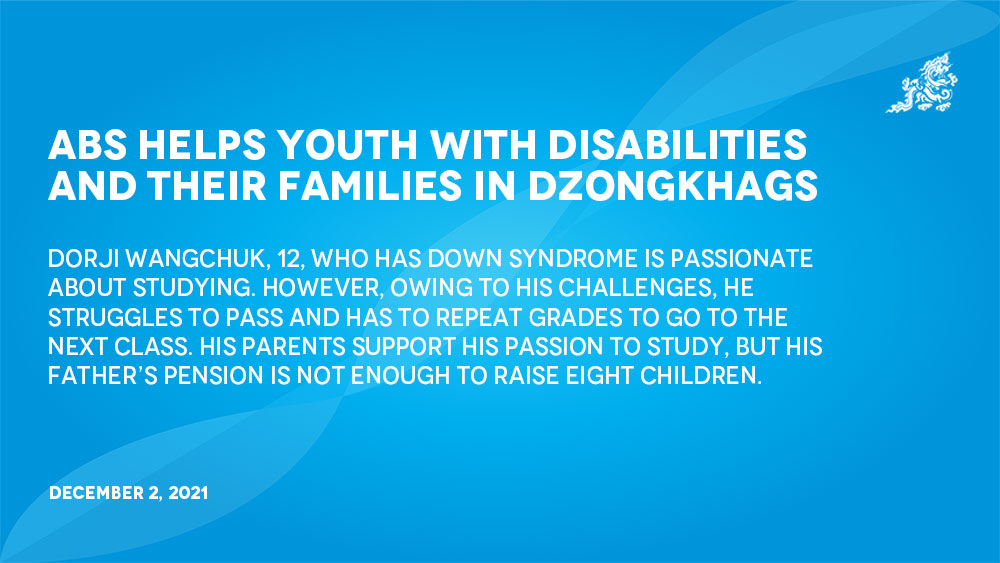Yangyel Lhaden
Dorji Wangchuk, 12, who has Down syndrome is passionate about studying. However, owing to his challenges, he struggles to pass and has to repeat grades to go to the next class. His parents support his passion to study, but his father’s pension is not enough to raise eight children.
The seed money from the Ability Bhutan Society’s (ABS) income generation programme for agricultural work came as a great relief to Dorji Wangchuk’s family.
Dorji Wangchuk’s father, Chetha, said that the surplus agricultural produce after feeding the family was sold to generate some additional income.
“I am teaching Dorji Wangchuk farming skills, if he wants to pursue farming to become independent when he grows up,” Chetah said.
This is part of ABS, in collaboration with the Federal Ministry of Economic Cooperation and Development, Germany and German Leprosy, and the TB Relief Association Asia’s pilot project Social Inclusive Development for People with Disabilities in Bhutan, is benefiting many young individuals and their families.
The three-year project began in 2019 in Chukha, Dagana, Trashigang, Punakha, and Sarpang to identify the number of persons with disabilities (PwD), especially women and children and learn more about their situation.
The project promotes social inclusion at all levels within the five domains of the World Health Organisation matrix domain, in terms of health, education, livelihood, social, and empowerment.
Project Manager, Namgay Dorji said that services were centred in Thimphu and the project was able to provide services to the PwDs doorsteps. “The dzongkhags with a higher number of PwDs were selected.”
He said that with the success of the project, ABS is planning to expand the services to other dzongkhags based on needs assessment.
Through the project, 166 children with disabilities, their parents, and caregivers have been provided life skills training, and sensitisation has been conducted with health workers, religious bodies, and teachers. About 1,000 caregivers and parents of PwDs were trained about self-care and self-esteem. In the disability assessment camp, 1,048 individuals were screened.
Namgay Dorji said that the disability assessment camp was important because many parents refuse to accept that their children are disabled. “Acceptance is important so that early interventions can reach children.”
The project has established five Early Childhood Care and Development (ECCD) model centres in the five dzongkhags that have infrastructures friendly for children with disabilities, and trained 179 ECCD facilitators.
According to the Population and Housing Census of Bhutan 2017, there are 1,618 children and young people between three and 24 years.
During the ongoing two-day conference on the project, the deputy chief programme officer with the Ministry of Education, Pema Chhogyel, said that school enrolment between the ages of three and 24 as of 2021 is 754, which is 46 percent of the total children living with disabilities.
He said that the lack of accessibility, lack of awareness in caregivers, and economic status of the family hampered children enrolling in school.
Pema Chhogyel said that for inclusive education, valuing, accepting, and supporting diversity in schools is important. “The Ministry of Education is going to inaugurate three special education needs (SEN) schools by the end of this year.”
By the end of this year, there will be 26 SEN schools across the country. The three new SEN schools will be established in Norbuling Central School in Gelephu, Samdrupjongkhar Primary School, and Gomdhar Central School in Samdrupjongkhar.
ABS registered around 3,026 PwDs through the project.
Edited by Tshering Palden


